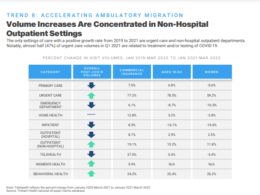the health strategy
review
for in-person health
and digital health strategy
Joaquim Cardoso MSc.
Senior Research and Strategy Officer (CRSO),
Chief Editor and Senior Advisor
January 18, 2023
Key Takeaways
Ozempic and Vegovie have brought significant changes to the obesity landscape in America, addressing one of the biggest preventable risk factors for death in the country.
- Next-generation medical options show promise in being even more effective in treating obesity and may have off-label implications for treating hard-to-treat addictions.
Crispr gene therapy has shown remarkable progress since the first application for sickle cell disease, with trials conducted for congenital blindness, heart disease, diabetes, cancer, and HIV.
- Around 400 million people worldwide suffer from diseases caused by single-gene mutations, making Crispr a potential corrective solution for such conditions.
- Crispr’s potential applications in the future could involve single-gene protection against high cholesterol, coronary artery disease, Alzheimer’s, or dementia.
The rate of disruptive scientific breakthroughs has been declining, partly due to academic pressures and researchers’ narrow focus.
However, research into new vaccines and treatments has been fruitful, offering hope for significant advancements in healthcare.
- Calls have been made to expedite drug development by reducing costs and streamlining the drug-approval process.
The challenge lies in ensuring global distribution and access to new technologies for the benefit of those who need them the most.
The question remains: Can we harness the existing biology and scientific knowledge to accelerate progress in medicine?
TO READ THE FULL VERSION












